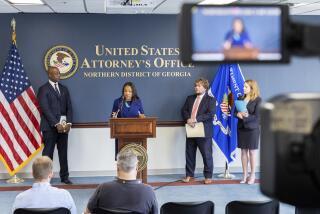Georgia started it: Russia ‘welcomes’ finding on August 2008 war
MOSCOW — Georgia’s artillery barrage against the breakaway republic of South Ossetia sparked last year’s brief but bloody war with Russia, according to a long-anticipated investigation whose findings were released Wednesday.
But the independent report commissioned by the European Union also blames Russia for provoking the conflict and escalating the fighting beyond “the reasonable limits.”
“There is no way to assign overall responsibility for the conflict to one side alone,” the report concludes.
Months of exhaustive investigation appear to have done little to change the general understanding of the chain of events, and the findings leave a public relations battle for the higher moral ground largely unresolved. Both Russia and Georgia crowed that the report backed up their own narratives of the conflict.
The Kremlin was quick to hail the finding that Georgia’s attack “marked the beginning” of the war. “We can only welcome this conclusion,” a spokeswoman said.
The Georgian government said the EU investigation concluded “that Russia invaded Georgia; Georgia never attacked Russia or any other country.”
“The report confirms that Russia committed an act of aggression against a sovereign state,” it said in a statement.
The bitterly debated question of who started the war has loomed over the region for a year.
The Georgian government said it attacked South Ossetia in response to an onslaught of Russian forces.
Moscow, which had peacekeepers based in the separatist republic, said additional troops were sent to South Ossetia and then deep into Georgia to defend against a Georgian operation already underway.
The EU report is carefully couched, saying that the Georgian shelling of the South Ossetian capital, Tskhinvali, on Aug. 7, 2008, started the fighting and could not be justified under international law. But the report also criticizes Russia for meddling in Georgia’s affairs and waging a war that “went far beyond the reasonable limits of defense.”
“Any explanation of the origins of the conflict cannot focus solely on the artillery attack on Tskhinvali,” says the report, written by Swiss diplomat Heidi Tagliavini. “It must take into account years of provocation, mutual accusations, military and political threats and acts of violence.”
‘It’s still going on’
The war lasted just five days. But the fighting over the war -- over who was right and who was wrong, who was the victim and who the aggressor -- lingers, feeding distrust between Moscow and the West and deepening tensions over geopolitical identity in the former Soviet Union.
“It’s 100% important who started the war. It’s the main issue of every war,” said Sergei Markov, a Russian lawmaker seen as being close to the Kremlin.
“This report says very clearly that [Georgian President Mikheil] Saakashvili is the aggressor and Ossetians are the victims. This is the most important thing.”
But other observers took a more nuanced stand.
“The problem is, the war was not a five-day war,” said political analyst Andrei Piontkovsky. “It did not begin on Aug. 7 and it did not end on Aug. 12. The preparation for war had gone on for several years, and in some sense it’s still going on.”
The most commonly accepted version of events has varied little since the war erupted.
Russia meddled for years, supporting separatists in South Ossetia and Georgia’s other breakaway republic, Abkhazia; distributing passports and pension payments to residents of the rebel regions; using the separatists as a countermove to U.S. support for Saakashvili and for the independence of Kosovo.
Skirmishes flared throughout the summer of 2008. And then, in the dead of night, Saakashvili launched a military operation into South Ossetia. Russian tanks and warplanes poured over the border, and the war had begun.
Russian escalation
The EU report does not confirm Georgian claims of a massive Russian troop influx before Georgia attacked. However, it does give weight to reports that Russia had been arming and training separatists and had allowed mercenaries to cross into Georgia in the days before the war.
The report also notes that extra Russian soldiers were on hand in South Ossetia at the outbreak of the war, and that Russian bombardment began earlier than Moscow said.
Russia is also criticized for its allegations that Georgia was carrying out a genocide against South Ossetians; for failing to honor Georgia’s cease-fire; and for failing to stop South Ossetian militiamen from looting, burning and raping their way through ethnic Georgian villages, though it notes that forces on all sides violated humanitarian and human rights laws.
Mostly, the report blames Russia for serious escalation of the conflict. Its tanks plunged far into Georgia, slicing the country in two and stopping just 30 miles short of the capital.
About 850 people were killed in the war, which crushed Georgia’s military and left tens of thousands of displaced Georgians still unable to go home.
“I don’t know what a proportionate response is in this kind of situation,” Dmitry Rogozin, Russia’s envoy to the North Atlantic Treaty Organization, told reporters this week.
“When you have acid splashed on your face and you put on brass knuckles and give the attacker a good punch, is that proportionate or disproportionate?”
Since the war, South Ossetia and Abkhazia have declared their independence, and been recognized by Russia, Nicaragua and Venezuela. But the republics had no right to secede from Georgia, the report concludes, and recognition of their independence is a violation of international law.
The South Ossetians remained defiant Wednesday.
“Saakashvili is a war criminal and it is time for the world to stop rewarding him,” South Ossetian President Eduard Kokoity said in a statement. “There is no going back. South Ossetia is an independent nation and will never again be part of Georgia.”
--
More to Read
Sign up for Essential California
The most important California stories and recommendations in your inbox every morning.
You may occasionally receive promotional content from the Los Angeles Times.










